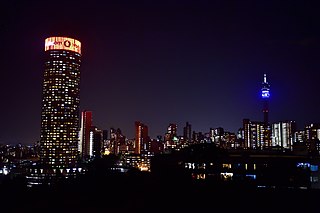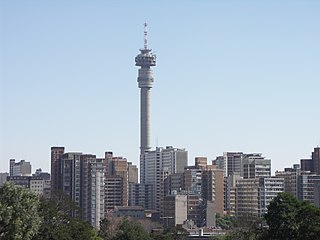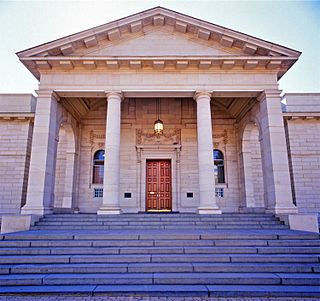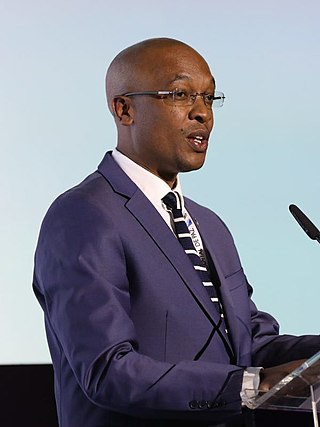Related Research Articles

A drag queen is a person, usually male, who uses drag clothing and makeup to imitate and often exaggerate female gender signifiers and gender roles for entertainment purposes. Historically, drag queens have usually been gay men, and have been a part of gay culture.

Johannesburg is the most populous city in South Africa with 4,803,262 people, and is classified as a megacity; it is one of the 100 largest urban areas in the world. It is the provincial capital and largest city of Gauteng, which is the wealthiest province in South Africa. Johannesburg is the seat of the Constitutional Court, the highest court in South Africa. Most of the major South African companies and banks have their head offices in Johannesburg. The city is located within the mineral-rich Witwatersrand hills, the epicentre of the international-scale mineral, gold and (specifically) diamond trade.

Hillbrow is an inner city residential neighbourhood of Johannesburg, Gauteng Province, South Africa. It is known for its high levels of population density, unemployment, poverty, prostitution and crime.
The Mayor of Johannesburg is the highest elected position in the city of Johannesburg, South Africa. Since 2000, they are the chief executive of the City of Johannesburg Metropolitan Municipality council. The position remained vacant from 24 April 2023, when Thapelo Amad announced his resignation after less than three months in office. On May 5, 2023, the council elected Al Jama-ah's Kabelo Gwamanda to the position.
CIDA City Campus was an accredited university, founded in 2000, located in Lyndhurst, Johannesburg. It offers three year degrees in Bachelor of Business Administration.
Forest Town, as the name implies, is a leafy suburb of Johannesburg, South Africa. It lies between the busy thoroughfares of Jan Smuts Avenue and Oxford Road, and is bordered to one side by the Johannesburg Zoo.

The Johannesburg Art Gallery is an art gallery in Joubert Park in the city centre of Johannesburg, South Africa. It is the largest gallery on the continent with a collection that is larger than that of the Iziko South African National Gallery in Cape Town.
Mark Gevisser is a South African author and journalist. His latest book is The Pink Line: Journeys Across the World's Queer Frontiers (2020). Previous books include A Legacy of Liberation: Thabo Mbeki and the Future of the South African Dream and Lost and Found in Johannesburg: A Memoir. His journalism has appeared in many publications, including The Guardian, The New York Times, Granta, and the New York Review of Books.
Nicholas Hlobo is a South African artist based in Johannesburg, South Africa. He was born in 1975 in Cape Town. He earned a Bachelor of Technology from Technikon Witwatersrand in 2002. He creates large sculptural works that are expansive masses that at once feel oozey, voluptuous, and highly structured. Through his work, he navigates his identity as a gay Xhosa man in South Africa and reevaluates the definitions of masculinity and sexuality in his country. The variance between femininity and masculinity is created by his use of materials such as rubber inner tubes, ribbon, organza, lace, and found objects. Hlobo cuts and sews objects back together to symbolize the idea of the healing that comes after a tearing apart in order to express his interest in the history of colonization in South Africa as well as the overt and covert ways that colonization occurs in modern life.

Mpho Franklyn Parks Tau is a South African politician who has been a Deputy Minister of Cooperative Governance and Traditional Affairs since March 2023 and a Member of the National Assembly of South Africa since February 2023, representing the African National Congress. Before becoming a member of Parliament, Tau had been a Member of the Gauteng Provincial Legislature where he served in the Gauteng Executive Council as MEC for Economic Development from December 2020 to October 2022. Prior to that, he was Deputy Minister of Cooperative Governance and Traditional Affairs between May 2019 and December 2020.
This is a timeline of notable events in the history of lesbian, gay, bisexual and transgender people in South Africa.
Zakhele Mbhele is a South African politician. A Member of Parliament of the Democratic Alliance in the National Assembly, Mbhele served as Media Liaison Officer for Western Cape Premier Helen Zille from November 2011 to May 2014. In the 2014 general election, Mbhele was elected to parliament. He is currently DA shadow minister of police.

There have been pride parades in South Africa celebrating LGBT pride since 1990. South African pride parades were historically used for political advocacy protesting against legal discrimination against LGBT people, and for the celebration of equality before the law after the apartheid era. They are increasingly used for political advocacy against LGBT hate crimes, such as the so-called corrective rape of lesbians in townships, and to remember victims thereof.

Joburg Theatre Complex, previously known as the Johannesburg Civic Theatre, is a group of four theatres situated in Braamfontein, Johannesburg, South Africa. It was built in 1962, refurnished in the late 1980s and reopened in the early 1990s before it was re-branded in 2009. It's a venue to stage both Broadway musicals and home grown productions. It is one of the few theatres open in Johannesburg for independent productions.
Joburg Ballet is a ballet dance company based within the Joburg Theatre, Johannesburg, South Africa. Joburg Ballet was formerly known as the South African Ballet Theatre (SABT). The company was formed in 2001 by six dancers who were retrenched by PACT Ballet. The company has been invited to perform in Russia in 2006 and has had exchange programmes with the Royal Swedish Ballet, the Royal Danish Ballet, the National Ballet of Canada, the Paris Opera and the San Francisco Ballet.
The Gay and Lesbian Organization of Witwatersrand (GLOW) was a non-governmental organization in South Africa that focused on gay and lesbian community issues.
Leon de Beer was a South African politician who served as a member of the South African Parliament from 1987 to 1989. His election was notable because he was the first candidate in the country to appeal to gay voters.

Kewpie (1942–2012) was a South African drag queen and hairdresser. She was a gender fluid individual who preferred feminine pronouns. Kewpie worked as a hairdresser in District Six and her salon became the center of the queer and drag community. She performed under the stage name of Capucine. Kewpie's large collection of photos is owned by the Gay and Lesbian Memory in Action (GALA) and documents queer life during apartheid.
The Forest Town raid was a 1966 police raid that targeted LGBT people in Forest Town, Gauteng. The raid led to proposed anti-homosexuality legislation in South Africa. It also helped coalesce the queer community in South Africa.
References
- 1 2 3 4 5 Gevisser, Mark (19 May 2016). "Gay rights pioneer who blazed a trail in Jozi leaves SA richer". The Mail & Guardian. Archived from the original on 22 February 2017. Retrieved 14 June 2020.
- 1 2 3 Meslani, Zane Lelo (5 October 2018). "The Art and Struggles of Drag". The Mail & Guardian. Retrieved 14 June 2020.
- ↑ Gevisser, Mark (15 April 2014). Lost and Found in Johannesburg: A Memoir. Macmillan. ISBN 978-0-374-17676-1. Archived from the original on 1 July 2020. Retrieved 17 June 2020.
- ↑ "Tracking the gay experience". Joburg. Archived from the original on 14 June 2020. Retrieved 14 June 2020.
- ↑ Chernis, Linda (20 May 2016). "Farewell Michele Bruno" (PDF). GALA. Archived (PDF) from the original on 14 June 2020. Retrieved 14 June 2020.